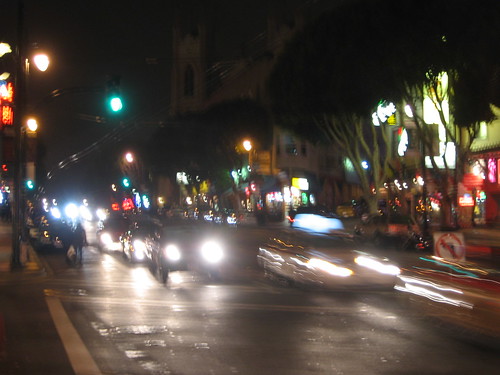Now that the big activities and festivities surrounding climate action day are over and everyone is back to their daily routines, I want to take a moment to reflect on the 350 theme. I’ve had a somewhat mixed relationship with the whole idea, because I wasn’t sure whether a mere number could really inspire the kind of shift in consciousness that is needed for humans to voluntarily “ramp down” our massively fossil fueled lifestyles.
Looking at the photos from all over the world I must say I was positively surprised by the creative outpouring these three little digits unleashed. It is a true testament to our human spirit and imagination that so many people from all over the world were able to perform magic tricks armed with nothing more than a dry mathematical calculation. However, it’s one thing to imagine a general, almost ethereal 350ness, the place we’d all like to be in a global collective sort of way, but the question now becomes: Can you and I imagine a different kind of life?

Climbers display a 350 flag atop Antarctica’s highest peak.
I know that a big part of the 350 campaign is to raise awareness about the severity of the climate crisis and pressure global leaders to adopt sweeping agreements with tough mandates to reduce carbon levels at the climate conference in Copenhagen. I know it’s not so much about specific action but more of a collective understanding that something needs to be done. I understand that we live in a world of short attention spans where a witty and sexy youtube video can reach and affect more people than any investigative journalism or deep think piece ever could.
But does it really change US? Does it make us more amenable to changing the way we relate to one another and to the fragile ecosystem within which we live? Does it make each of us scale down on our consumption or is it just a Disneyesque projection of a collective feelgood story and hope for better days while individually we go about in our business as usual?
While I positively believe in the power of a collective shift in consciousness, I am concerned that by making a very ethereal, almost intangible number the actual object of our intended shift we may be leading ourselves into a false sense of identity, an archetype of sorts that represents us all and yet speaks to nobody directly. In my mind, the 350 concept feels like the attractive Supermodel herself, who we all love to watch, adore, celebrate, and project all our hopes and dreams onto, but it’s the image of her we’re attracted to rather than the actual person. Likewise, I worry that by putting so much of our hopes and dreams and buzz into this Supernumber 350, we may be tempted to diminish or overlook the fact that to actually get to that number we are all going to have to make drastic changes in our everyday lives.
 There are those who believe that we can transition into a low carbon/fossil fuel economy by the sheer brilliance of yet unknown technological advances, that we can all drive cars, have new gadgets every year and live our lives in the fast lane, but do it all on renewable energy and recycled materials. The hope is that if only we can get our governments and industries to invest in the right kind of energy models, then We the People can go about our business as usual. But I just don’t think it’s possible for us to continue to live so high on the hog: Moving, feeding and supercharging ourselves on millions of years of borrowed energy stored in fossil fuels has not only depleted 50% of those fuels in just 100 years, but has wound us humans up like energizer bunnies, plowing over a very fragile and life-sustaining ecosystem in our thirst for ever more. So even if we were able to replace fossil fuels with solar, wind, hydro, nuclear, or whatever else to keep ourselves supercharged we would still be consuming the planet and ourselves to oblivion.
There are those who believe that we can transition into a low carbon/fossil fuel economy by the sheer brilliance of yet unknown technological advances, that we can all drive cars, have new gadgets every year and live our lives in the fast lane, but do it all on renewable energy and recycled materials. The hope is that if only we can get our governments and industries to invest in the right kind of energy models, then We the People can go about our business as usual. But I just don’t think it’s possible for us to continue to live so high on the hog: Moving, feeding and supercharging ourselves on millions of years of borrowed energy stored in fossil fuels has not only depleted 50% of those fuels in just 100 years, but has wound us humans up like energizer bunnies, plowing over a very fragile and life-sustaining ecosystem in our thirst for ever more. So even if we were able to replace fossil fuels with solar, wind, hydro, nuclear, or whatever else to keep ourselves supercharged we would still be consuming the planet and ourselves to oblivion.
It’s certainly understandable that we would think we could keep our current growth pattern or imagine it to last indefinitely, simply because it’s never been any different during any of our lifetimes. The power of our imagination is unlimited, but the underlying root cause of this and where I think the movement needs to put much more work and thought into is the inherent fear of change, of slowing down. We are all so indoctrinated in the capitalistic myth of perpetual growth and instant gratification, that the idea of slowing down or living a more simple life has become this most horrifying thought in our head. We’ve become so accustomed to ever more comfort and convenience that we’re psychologically conditioned to see anything that could be construed as primitive as a threat to our well being and happiness.
 Some say that the unsustainable system of capitalism must change in order for us and the world to change. In my view, this can only happen when a growing number of individuals is willing to look deeper into our own relationship with perpetual growth and our real and imagined fear of scarcity. Capitalism and its preachers have been very adept at planting this seed of fear in our collective consciousness, equating anything that’s not growth or consumption-oriented with scarcity and unhappiness. This is where I think the biggest challenge as well as the biggest opportunity lies in the struggle not only to reduce greenhouse gases, but to create the foundation for humanity to live in balance within the web of life on Planet Earth. Talking about individual sacrifice has in many ways been the third rail of the climate change debate, but it doesn’t need to be, and I’ll tell you why.
Some say that the unsustainable system of capitalism must change in order for us and the world to change. In my view, this can only happen when a growing number of individuals is willing to look deeper into our own relationship with perpetual growth and our real and imagined fear of scarcity. Capitalism and its preachers have been very adept at planting this seed of fear in our collective consciousness, equating anything that’s not growth or consumption-oriented with scarcity and unhappiness. This is where I think the biggest challenge as well as the biggest opportunity lies in the struggle not only to reduce greenhouse gases, but to create the foundation for humanity to live in balance within the web of life on Planet Earth. Talking about individual sacrifice has in many ways been the third rail of the climate change debate, but it doesn’t need to be, and I’ll tell you why.
By not talking openly and enough about the need for a change in our lifestyle we’re tacitly playing into the capitalistic storyline that if we’re not constantly consuming and pampered by convenience we’re sacrificing something, falling short. For example, we’ve totally conceded the conventional wisdom that faster is always better, based on utilitarian measurement only. Thus it feels like a sacrifice to trade in a five minute car ride to the grocery store for a half hour walk. After all, time is money, and we’ve gotten ourselves into a mental space where we’ve come to believe that that’s all it is. We don’t take into account that we get a nice workout, might run into a friend or smell the spring blossoms of a neighbor’s tree on our walk. It’s almost as if these more sublime benefits to our physical and spiritual well being are being stored away in capitalism’s deep chamber of externalities, along with things like pollution, dwindling biodiversity, or resource depletion.
The myth of material happiness and its implied fear of perceived scarcity is one of the biggest hurdles we’re facing in our quest to get to 350ppm, or that which it stands for, life in balance with the earth’s ecosystem. So to me, the most meaningful way to get past that hurdle is to change the storyline that we can’t live happy and fulfilling lives without constant growth and acceleration. I think it’s time to speak to people directly about simplifying their lives, about slowing down and making more with less. But rather than talking about it in terms of sacrifice and shortage, or of replacing the fear of scarcity with the fear of doom, we need to shoot straight for the soul truth of the matter that living a simple life can be full of happiness, fulfillment, and dare I say, wealth.
 Let me give you some examples: You can talk all day about industrialized agriculture and its role in producing unprecedented amounts of CO2, but it’s not until someone has sunk their teeth into a juicy organic heirloom apple or dug their hands into the soil that they are personally connected to changing that dynamic. You can bring attention to automobile emissions, but it’s not until someone has worked up a sweat and lost a few pounds while riding their bike to work that they understand the fun of low carbon living. You can bemoan the wastefulness of buying plastic chotchkies from China, but it’s not until someone receives a gift handmade from an old pallet that they see the beauty of reusing what’s already there. You may say that this won’t matter in the grand scheme, but these are the acts that pull intellectual exercises and theoretical models and propositions right down into our core where we can feel it. Because in the grandest of all schemes, the mind searches for what the heart knows.
Let me give you some examples: You can talk all day about industrialized agriculture and its role in producing unprecedented amounts of CO2, but it’s not until someone has sunk their teeth into a juicy organic heirloom apple or dug their hands into the soil that they are personally connected to changing that dynamic. You can bring attention to automobile emissions, but it’s not until someone has worked up a sweat and lost a few pounds while riding their bike to work that they understand the fun of low carbon living. You can bemoan the wastefulness of buying plastic chotchkies from China, but it’s not until someone receives a gift handmade from an old pallet that they see the beauty of reusing what’s already there. You may say that this won’t matter in the grand scheme, but these are the acts that pull intellectual exercises and theoretical models and propositions right down into our core where we can feel it. Because in the grandest of all schemes, the mind searches for what the heart knows.
I know these are all things that many folks in the 350 campaign are aware of and support, it’s all part of a whole range of things that need to go hand in hand in this epic shift we’re all envisioning. If Supermodels taking their clothes off and mountain climbers holding up signs is going to pique the curiosity of a few new folks to find out more about the issue, I’m all for it. But we’ve got to be careful not to let the message itself take up so much space that it obscures that which it is trying to call attention to: We’ve got to scale down! (and it’ll feel good, like relief from a big headache, or a breath of fresh air) This will only be a successful campaign if the discussion can evolve from a generalized We must get to 350! to This is what you can do to live a happier and healthier life in balance with the planet. After all, Mother Earth doesn’t care what label we put on the bottle, only what we put in it.








Hi Sven,
Great article.
Urban Transformation is the way toward truly thriving lifestyles. I am working to make this a reality.
Too much to say here, so please visit my blog … http://www.davidnock.com/ and let’s talk …
The world needs this work.
David
David, great blog! I put you on my blog roll and will be stopping by whenever I can. Have you heard of Ecocity Builders? I’ve been working with them on some amazing projects of urban transformation. Will be at the Ecocity World Summit in Istanbul in December. Chek it out:
http://ecocitybuilders.org
http://ecocity2009.com
Thanks Sven!
I’ve just learned of your blog and enjoy your fine word/thought craft.
*
*
Yes, I’m well aware of EcoCity Builders, and the upcoming conference. Figured they were busy with preps, and thought you may have some insight. May I contact you?
We can create EcoCities … my creating projects that benefit so many, and to such an extent, that such work can’t NOT happen!
People are wiling to go through the hassle, stress and bear the financial burden of ‘home renovations’ for an end result that is worthwhile.
So, too, shall it be with larger-scale neighbourhood/community/city ‘renovations’. That’s Urban Transformation.
We can create the situation(s) in which people want Urban Transformation projects to proceed … because they recognize the benefits to themselves (direct and indirect); they understand it is something they need for themselves …
… even those who aren’t interested in eco/enviro issues, or believe in climate change, global warming, biodiversity loss … even such people will be in favour of Urban Transformation projects for their own personal self-interests: employment, commercial opportunities; taxes, votes; profit …
People need work. Politicians need promise – taxes, votes. Capitalists need profit potential.
Only ‘situations’ that satisfy a broad range of ‘interests’ … reaching critical mass(es) for systemic change … will achieve the results we need.
This work ought to be introduced/promoted at the conference!
The world need the hope and promise of something BIG … something to believe in (if only for themselves); something to be a part of … Urban Transformations!